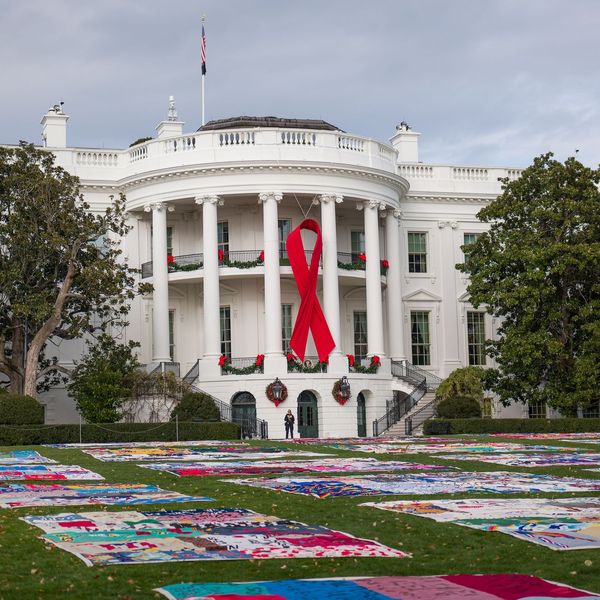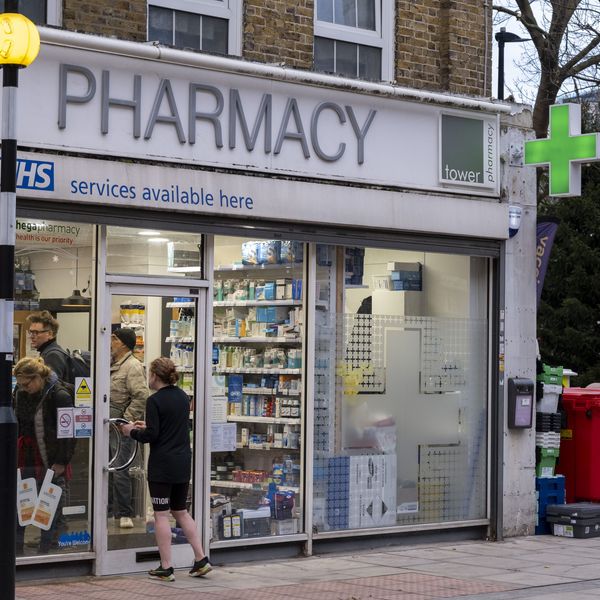On World AIDS Day, Warnings of TPP's "Real Threat" to Medication Access
'Our trade deals should put people before profits, but TPP would do just the opposite.'
The Trans-Pacific Partnership (TPP), a controversial 12-nation deal that critics warn favors corporate power over public health, specifically threatens access to essential drugs for people with HIV and AIDS, an advocacy group warned Tuesday marking World AIDS Day.
"By harming access to live-saving medications, the TPP poses a real threat to our continued progress in fighting the pandemic," said Jerame Davis, executive director of Pride at Work, an AFL-CIO subsidiary that organizes support for labor and LGBTQI issues. "Continued worldwide progress in containing and fighting back against HIV/AIDS means access to affordable drugs."
Provisions in the TPP would allow, among other things, extended patents on biologics that would grant Big Pharma free rein to ratchet up prices on what Pride at Work calls "the most effective" HIV/AIDS medications.
As economist Dean Baker recently explained, "Patent monopolies provide both enormous incentive and opportunity for drug companies to increase profits at the expense of patients."
Such monopolistic protections for drug manufacturers--which already exist to some extent and would only be expanded through the so-called trade deal--"would have a dramatic effect on access to safe and affordable care for millions of people worldwide," Pride at Work said Tuesday.
International aid agency Oxfam in May warned that the TPP would "do more to undermine access to affordable medicines than any previous U.S. trade agreement" and that the agreement's intellectual property provisions "are incoherent and inconsistent with U.S. global health policy."
In one example, Oxfam found that under the TPP's rules, more than half of HIV/AIDS patients in Vietnam would lose access to vital medication. There are over 250,000 people living with those viruses in Vietnam alone.
"World AIDS Day is an annual chance to reflect on our battle against the HIV/AIDS pandemic and a reminder that we have an obligation to care for each other," Davis said Tuesday. "Treatment of those living with the virus is needed not only to save the lives those living with HIV/AIDS, but to prevent new infections as well--those who have access to treatment are less likely to pass on the virus. Our trade deals should put people before profits, but TPP would do just the opposite."
An Urgent Message From Our Co-Founder
Dear Common Dreams reader, The U.S. is on a fast track to authoritarianism like nothing I've ever seen. Meanwhile, corporate news outlets are utterly capitulating to Trump, twisting their coverage to avoid drawing his ire while lining up to stuff cash in his pockets. That's why I believe that Common Dreams is doing the best and most consequential reporting that we've ever done. Our small but mighty team is a progressive reporting powerhouse, covering the news every day that the corporate media never will. Our mission has always been simple: To inform. To inspire. And to ignite change for the common good. Now here's the key piece that I want all our readers to understand: None of this would be possible without your financial support. That's not just some fundraising cliche. It's the absolute and literal truth. We don't accept corporate advertising and never will. We don't have a paywall because we don't think people should be blocked from critical news based on their ability to pay. Everything we do is funded by the donations of readers like you. Will you donate now to help power the nonprofit, independent reporting of Common Dreams? Thank you for being a vital member of our community. Together, we can keep independent journalism alive when it’s needed most. - Craig Brown, Co-founder |
The Trans-Pacific Partnership (TPP), a controversial 12-nation deal that critics warn favors corporate power over public health, specifically threatens access to essential drugs for people with HIV and AIDS, an advocacy group warned Tuesday marking World AIDS Day.
"By harming access to live-saving medications, the TPP poses a real threat to our continued progress in fighting the pandemic," said Jerame Davis, executive director of Pride at Work, an AFL-CIO subsidiary that organizes support for labor and LGBTQI issues. "Continued worldwide progress in containing and fighting back against HIV/AIDS means access to affordable drugs."
Provisions in the TPP would allow, among other things, extended patents on biologics that would grant Big Pharma free rein to ratchet up prices on what Pride at Work calls "the most effective" HIV/AIDS medications.
As economist Dean Baker recently explained, "Patent monopolies provide both enormous incentive and opportunity for drug companies to increase profits at the expense of patients."
Such monopolistic protections for drug manufacturers--which already exist to some extent and would only be expanded through the so-called trade deal--"would have a dramatic effect on access to safe and affordable care for millions of people worldwide," Pride at Work said Tuesday.
International aid agency Oxfam in May warned that the TPP would "do more to undermine access to affordable medicines than any previous U.S. trade agreement" and that the agreement's intellectual property provisions "are incoherent and inconsistent with U.S. global health policy."
In one example, Oxfam found that under the TPP's rules, more than half of HIV/AIDS patients in Vietnam would lose access to vital medication. There are over 250,000 people living with those viruses in Vietnam alone.
"World AIDS Day is an annual chance to reflect on our battle against the HIV/AIDS pandemic and a reminder that we have an obligation to care for each other," Davis said Tuesday. "Treatment of those living with the virus is needed not only to save the lives those living with HIV/AIDS, but to prevent new infections as well--those who have access to treatment are less likely to pass on the virus. Our trade deals should put people before profits, but TPP would do just the opposite."
The Trans-Pacific Partnership (TPP), a controversial 12-nation deal that critics warn favors corporate power over public health, specifically threatens access to essential drugs for people with HIV and AIDS, an advocacy group warned Tuesday marking World AIDS Day.
"By harming access to live-saving medications, the TPP poses a real threat to our continued progress in fighting the pandemic," said Jerame Davis, executive director of Pride at Work, an AFL-CIO subsidiary that organizes support for labor and LGBTQI issues. "Continued worldwide progress in containing and fighting back against HIV/AIDS means access to affordable drugs."
Provisions in the TPP would allow, among other things, extended patents on biologics that would grant Big Pharma free rein to ratchet up prices on what Pride at Work calls "the most effective" HIV/AIDS medications.
As economist Dean Baker recently explained, "Patent monopolies provide both enormous incentive and opportunity for drug companies to increase profits at the expense of patients."
Such monopolistic protections for drug manufacturers--which already exist to some extent and would only be expanded through the so-called trade deal--"would have a dramatic effect on access to safe and affordable care for millions of people worldwide," Pride at Work said Tuesday.
International aid agency Oxfam in May warned that the TPP would "do more to undermine access to affordable medicines than any previous U.S. trade agreement" and that the agreement's intellectual property provisions "are incoherent and inconsistent with U.S. global health policy."
In one example, Oxfam found that under the TPP's rules, more than half of HIV/AIDS patients in Vietnam would lose access to vital medication. There are over 250,000 people living with those viruses in Vietnam alone.
"World AIDS Day is an annual chance to reflect on our battle against the HIV/AIDS pandemic and a reminder that we have an obligation to care for each other," Davis said Tuesday. "Treatment of those living with the virus is needed not only to save the lives those living with HIV/AIDS, but to prevent new infections as well--those who have access to treatment are less likely to pass on the virus. Our trade deals should put people before profits, but TPP would do just the opposite."

